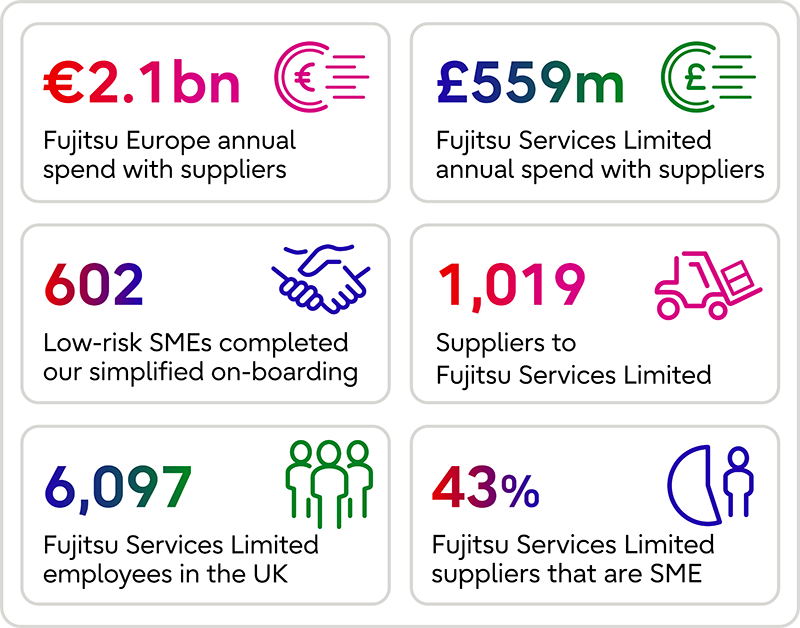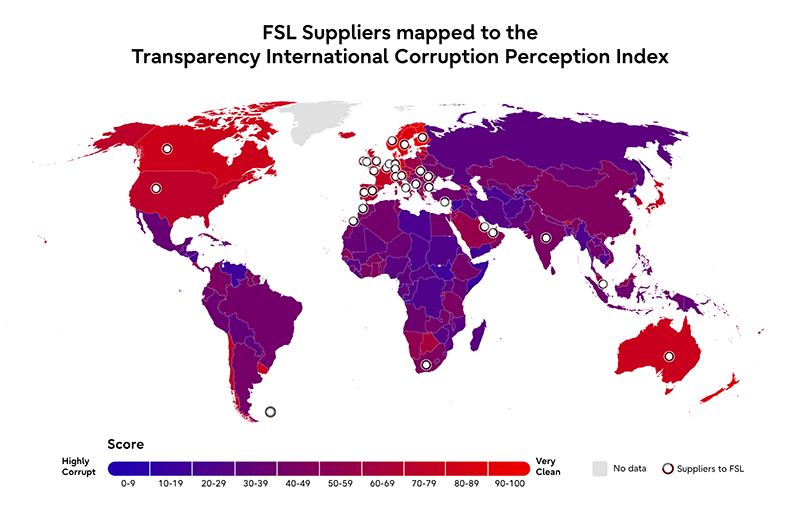Fujitsu Services Limited: Modern Slavery Statement 2024
The continued prevalence of forced labour and human trafficking is a serious global issue with millions of victims, and we will not tolerate this within our organisation or within our supply chain. We are proud that responsible business forms part of our core global strategy and vision, we actively align our framework to help contribute towards the United Nations Sustainable Development Goals (SDGs), and we are committed to ensuring we minimise the risk associated with forced labour, modern slavery and human trafficking laid out in SDG 8.7.
Structure of Organisation
Fujitsu Limited (Fujitsu) is a global technology company headquartered in Japan and is the ninth largest provider of IT solutions in the world, with more than 124,000 employees worldwide who provide customers in more than 100 countries with local support. Fujitsu Services Holdings PLC (FSH) is a wholly owned subsidiary of Fujitsu Limited and the parent of the majority of Fujitsu’s UK legal entities. Fujitsu Services Limited (FSL) is the primary trading entity, operating in the UK and Ireland. This statement is to meet the requirement for FSL to comply with Section 54, Part 6 of the Modern Slavery Act 2015.
Any reference to supplier data or information within this statement concerns suppliers under the remit of the International Chief Procurement Officer.
Policies and Practices
At Fujitsu Limited, Responsible Business, otherwise known as Corporate Social Responsibility (CSR), is firmly anchored in our corporate philosophy. This is underpinned by a number of policies:
- The Fujitsu Way: Our Global Business Standards contained within The Fujitsu Way govern our relationships with all stakeholders involved: employees, customers, suppliers, governments, other businesses and local communities.
- In December 2014, the Fujitsu Group released the “Fujitsu Group Human Rights Statement” to promote activities that respect human rights in accordance with this Code of Conduct, as set out in the Fujitsu Way. The statement was revised in December 2022, and has been prepared in 21 languages, including Japanese and English, with the aim of ensuring that it becomes embedded in the corporate culture of all our group companies. We have notified our major suppliers of the revisions and request that they familiarise themselves with the revised Statement and comply with its content. The statement recognises the importance of international standards, including the International Bill of Human Rights and the International Labour Organisation's Declaration on Fundamental Principles and Rights at Work. It includes reference to the Fujitsu Guiding Principles for Respect for Human Rights in Employment, in which Fujitsu commits to providing equal opportunities, respecting human rights in employment practices, eliminating discrimination, and banning forced labour and child labour.
- Procurement Master Policy: FSL has a series of master policies, including a Procurement Master policy, which are applicable across the Europe region (including UK and Ireland). The Procurement Master Policy explicitly states that any third-party supplier must act ethically, fairly, consistently and comply with the Fujitsu Global Business Standards which are contained within our Fujitsu Way governance.
- Fujitsu Group CSR Procurement Guideline: Fujitsu Limited have been members of the Responsible Business Alliance (RBA) since March 2017. The RBA is the world’s largest coalition dedicated to corporate social responsibility in global supply chains. The Fujitsu Group has adopted the RBA Code of Conduct as its CSR Procurement Guideline. We expect our suppliers to support the Fujitsu Group CSR Procurement Guideline and conduct their worldwide operations in a socially and environmentally responsible manner.
- Responsible Procurement Charter: We recognise that our Small/Medium Enterprise (SME) suppliers may not be able to demonstrate full compliance with the RBA Code of Conduct; however, we do ask that they embrace the ethos of the Code and join us on a journey to work towards compliance. In 2021, FSL published the latest version of the Responsible Procurement Charter to facilitate this journey. We expect all SME suppliers to Fujitsu to aspire to this set of principles based on the RBA, not only in their own organisation but also throughout their supply chains. The Charter outlines standards for Labour, Health & Safety, Environment, and Business Ethics.

Due Diligence
Supplier Due Diligence: FSL uses a risk-based questionnaire as part of our supplier due diligence process which includes questions based on the UN Global Compact’s Ten Principles in the areas of human rights, labour, environment, and anticorruption. FSL assess suppliers in those areas to ensure that our suppliers mirror our values in relation to those topics. FSL recognise that smaller organisations may not have developed policies for human rights and labour but are still a key part of our supply chain. The Responsible Procurement Charter was created for low-risk SMEs to subscribe to key values, including the prohibition of the use of forced labour or child labour. This approach allows FSL to continue work with smaller organisations and positively influences their approach. Whilst this approach is established in the UK at present, FSL are continuing to work to standardise due diligence across Europe, demonstrating our commitment to preventing Modern Day Slavery throughout the region, and all new suppliers are asked to sign up to our Responsible Procurement Charter or the Responsible Business Alliance Code of Conduct.Terms and Conditions: FSL’s standard contract templates have a schedule dedicated to the ethical performance of our suppliers, explicitly prohibiting use or tolerance of child, and forced labour. This ensures that any commitments made at the due diligence stage are underpinned by a contractual requirement and legally enforceable. Templates also include other contractual provisions such as the right to audit.
Internal Due Diligence: As part of internal due diligence practices, we have measures in place to ensure there is no slavery within our FSL workforce. Before onboarding a new employee, we require evidence of the right to work in the UK. Permanent and temporary staff hired through recruitment agencies go through the same vetting process as a direct candidate and we do not offer any zero-hour contracts.
Risk Analysis and Next Steps
Following the enactment of the Modern Slavery Act 2015, we conduct an annual mapping exercise to locate suppliers in countries at higher risk of forced labour using Transparency International’s Corruption Perception Index. This has identified that the vast majority of FSL suppliers are in very low risk areas. Over 99% of FSL’s total spend is with countries indexed in the lower risk categories. However, we acknowledge that there are a very small number of suppliers that fall into the higher risk brackets. We will work to mitigate those risks within our supply chain on an ongoing basis.
We acknowledge that the services industry is high risk for modern slavery and appreciate that our business has suppliers in this category (predominately IT Services). However, using the Transparency International Corruption Perception index, we identified that our services-based suppliers are not based in higher risk areas.
We use this intelligence to minimise the risk of forced labour in our supply chain. We leverage our membership with the Responsible Business Alliance to develop our approach to eradicating Modern Slavery. We continue to undertake a number of audits via our global sourcing team which include assessing key labour practices, and continue to review how we can effectively use this to mitigate any risk identified. Where any issues are found, an action plan is formulated and agreed. We continually review and improve the process in line with industry best practice.
We work with our suppliers using our SME Engagement Programme as the main vehicle for collaboration with limited resource, smaller suppliers. We will continue to take this collaborative approach in managing the risk for forced labour together with our suppliers.

Key Performance Indicators
We understand that particular performance indicators could influence and create modern slavery risks within an organisation if not managed carefully. Our key performance indicators (KPIs) for the Global Supply Chain Unit centre on the value of the product or service being procured. The value includes ability to deliver, quality, indirect costs and additional value add. Any anomalies, such as significantly lower price or faster delivery, identified in procuring products or services would be eliminated from the opportunity by default, to avoid any associated risks of modern slavery.
Training
Throughout the financial year 2024, Fujitsu has continued its dedication to raising awareness and educating stakeholders about human rights through targeted training programs. This year, we reworked our global human rights training, aiming for a 90% completion rate across Fujitsu globally by FY25. The training provides all employees with a solid foundation on the importance of respecting human rights in all business activities, encompassing the Fujitsu Human Rights Statement and key international legal frameworks like the ILO Core Conventions.
This year, we have developed educational materials for suppliers and partners, focusing on essential human rights concepts, the necessity of conducting human rights due diligence, and practical guidance on implementation. These materials include downloadable content, updates on recent and upcoming regulations, and information on our whistleblowing systems. To ensure relevance, we conducted a proof of concept (POC) with close partners, resulting in 82% of participants reporting an increased understanding of human rights and 100% affirming a better grasp of conducting human rights due diligence. Fujitsu is committed to supporting our suppliers and partners in enhancing their human rights awareness and mitigating risks within our supply chains.
Additionally, during the financial year 2024, we have created training for Fujitsu UK employees covering Modern Slavery specifically. The training covers the signs and symptoms of Modern Slavery, how to report it, the Fujitsu Modern Slavery Statement and our organisational obligations, and has a specific focus on the UK Modern Slavery Act (2015).
Whistleblowing
Our whistleblowing scheme, Fujitsu Alert, is prominently positioned across the organisation. Employees and third parties can lodge concerns via the system confidentially. These are then investigated independently. All employees in the UK have received training during 2024, covering how to speak-up about concerns up to and including whistleblowing.
Due to the varied nature of concerns, which may involve an internal investigation, it is not possible to lay down precise timescales for resolution. The investigating officer will ensure that the investigations are undertaken as quickly as possible without affecting the quality and depth of those investigations.
In addition to Fujitsu Alert, since November 2023 the Fujitsu Group has been participating in the Engagement and Remedy Platform, operated and provided by Japan Center for Engagement and Remedy on Business and Human Rights (JaCER). The platform receives complaints and reports on human rights where reports can be made anonymously and is available to both internal and external parties. JaCER provides a non-judicial platform for grievance redress and acts in a professional capacity to support and promote the redress of grievances based on the United Nations Guiding Principles on Business and Human Rights.
The Board of Directors approved this statement at a meeting of the Board on 17th September 2024.

CEO, Europe Services
Please direct any questions on this statement to Joley Gordon - Human Rights Lead, UK (joley.gordon@fujitsu.com)

